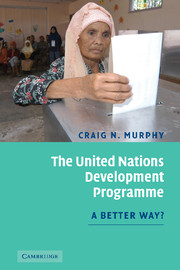Book contents
- Frontmatter
- Contents
- List of figures
- List of tables
- Foreword by Kemal Dervis
- Acknowledgements
- 1 Not the standard image
- 2 Development and the United Nations
- 3 Institutions for practical solidarity
- 4 Decolonization and economic transformation
- 5 Lewis in Ghana and after
- 6 Capacity, consensus, crisis, and consequences
- 7 Engaging liberation movements and revolutionary states
- 8 A learning organization: women, Latin America, and Africa
- 9 ‘Bottoms up’ development helps make UNDP a mammal
- 10 Working for ‘a holy man’ after the cold war
- 11 ‘Fabian socialists do not make the cut’
- 12 ‘Ploughing the sea’? UNDP and the future of global governance
- Index
7 - Engaging liberation movements and revolutionary states
Published online by Cambridge University Press: 08 January 2010
- Frontmatter
- Contents
- List of figures
- List of tables
- Foreword by Kemal Dervis
- Acknowledgements
- 1 Not the standard image
- 2 Development and the United Nations
- 3 Institutions for practical solidarity
- 4 Decolonization and economic transformation
- 5 Lewis in Ghana and after
- 6 Capacity, consensus, crisis, and consequences
- 7 Engaging liberation movements and revolutionary states
- 8 A learning organization: women, Latin America, and Africa
- 9 ‘Bottoms up’ development helps make UNDP a mammal
- 10 Working for ‘a holy man’ after the cold war
- 11 ‘Fabian socialists do not make the cut’
- 12 ‘Ploughing the sea’? UNDP and the future of global governance
- Index
Summary
Indeed, much was positive about becoming the development programme of the developing world, even if not all the factors that moved UNDP in that direction had been anticipated or welcomed by its first generation of leaders. The downside was that the Programme risked becoming irrelevant, at best, to UNDP's early champion and major supporter, the United States government, an important critic of the new assertiveness of the Third World.
By the mid-1970s, the anti-Third World coalition within the US government had two factions, each with its own argument against a UNDP that had become identified with the developing nations. Traditional US conservatives – some of them isolationists, more of them advocates of a ‘Free World’ alliance against ‘global communism’ – believed that UNDP's universalism reinforced Third World tyrants including those who, in this view, had created the oil crises of 1973–4 (following the October War against Israel) and 1979 (after Iran's Islamic Revolution). In contrast, there were the self-described political ‘realists’ – including Richard Nixon and Henry Kissinger – who were willing to live with tyrants and communists as long as they respected the global status quo.
Brad Morse had UNDP take on new activities that responded to the realists' criticism of UN development assistance and helped quiet that group's larger fears. Ironically, perhaps, Morse did so by having the Programme reach out to, and to work with and cultivate, those developing states and nationalist movements that were most often lambasted by US conservatives as their country's greatest enemies: ‘Red’ China, Vietnam, revolutionary Iran, the Palestinians, and nationalists on the left throughout southern Africa.
- Type
- Chapter
- Information
- The United Nations Development ProgrammeA Better Way?, pp. 170 - 198Publisher: Cambridge University PressPrint publication year: 2006

